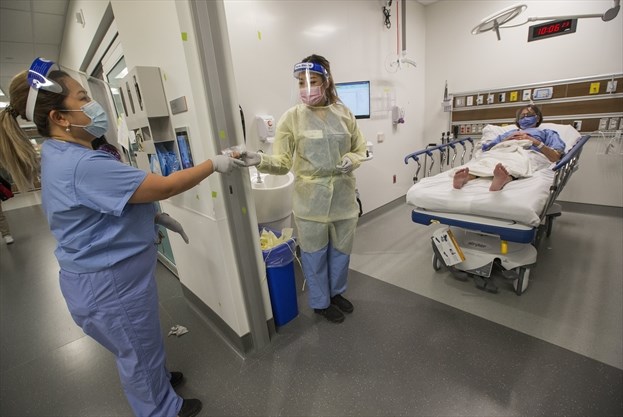Facing enormous, sustained levels of stress, many are thinking of leaving the profession
Eram Chhogala works as an emergency department registered nurse at two hospitals in Toronto. In the last year, she’s sat by the bedsides of dying COVID-19 patients and consoled their families. She’s comforted colleagues and self-soothed with meditation and prayer.
At the same time, she’s seen a lot of her peers come and go, as if through rotating doors.
“The turnover of nurses, especially in emergency departments, is high because they’re so tired,” she said. “People are burned out; they’re mentally exhausted and they can’t do it anymore.”
So, she wasn’t surprised to hear the results of a recent study by the Registered Practical Nurses Association of Ontario (WeRPN) on the toll the pandemic has taken on the mental health of nurses in Ontario.
The study, entitled “Wellness, Workload and Wages — How RPNs are Personally Coping Amid the Pandemic,”outlines the results of a survey of 765 nurses in a variety of health-care settings across the province in December. It reveals RPNs are facing a critical breaking point, alarming mental health tolls and financial stresses as a direct result of their job since the pandemic began last March.
The study was designed to give nurses, health-care organizations, policy-makers and the public a glimpse into the deep personal and professional toll the pandemic has had on the nursing community, said Dianne Martin, WeRPN CEO.
“The reason we decided to start asking questions in a more formal manner was because with the stories we were hearing, it became apparent to us there was some real suffering going on, and we felt (it) was important to see how pervasive it was and what the implications were,” she said.
PANDEMIC IMPACTS
According to the survey, 71 per cent of nurses report experiencing a breaking point related to their job over the past several months, while 34 per cent said they’re considering leaving the profession.
Most, 83 per cent, said they feel like their mental health has been adversely affected by their work, while 67 said they don’t have adequate mental health support.
Another 83 per cent reported having reduced the time they spend with their immediate family over concerns about exposing them to the virus. Nearly all respondents, 96 per cent, said their workdays have become exponentially more stressful, while 90 per cent said their workload has increased.
Ironically, 57 per cent said they are experiencing financial stress due to the pandemic, and 32 per cent have had to leave one of two part-time jobs due to government policies restricting many nurses to one workplace to limit the spread of the virus.
In addition to financial stress due to job loss, Martin said many health-care workers have had to take unpaid time off work after becoming infected with COVID-19. While some employers offer paid sick days, there is no law in Ontario that mandates paid sick days for all workers.

WHAT’S AT STAKE
WeRPN’s findings show what we know anecdotally: that the mental well-being of hundreds of thousands of Ontarians working in health care is at stake. The study also highlights the risk of losing large numbers of nursing staff to career changes.
Martin said it isn’t easy to monitor how many nurses are leaving or entering the profession at any given time, but said Ontario will have a “very serious problem on our hands” if the volume of nurses who say they’re ready to leave do so.
“Nursing care is so much more than the public really know because we’re a knowledge-based profession. When we lose that knowledge from the health-care environment, that’s going to impact the patient outcomes,” she said.
“We need to be able to take these nursing experts … and we need to keep that expertise in our system. If we lose that expertise, it’s going to be much harder to have good outcomes from our health-care efforts.”
